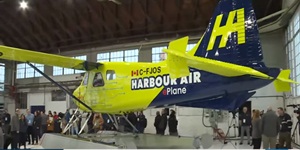The world's first fully electric commercial aircraft took its inaugural test flight on Tuesday, taking off from the Canadian city of Vancouver and offering hope that airlines may one day free themselves from polluting fossil fuels and end their polluting emissions.

The first flight of the fully electric commercial aircraft took place on Tuesday around Vancouver, Canada. The whole flight lasted just 15 minutes.
The plane was a 62-year-old, six-passenger seaplane that had been retrofitted with an electric motor. It was designed by Australian engineering firm MagniX and tested in partnership with Harbour Air, the world’s largest seaplane airline.
Harbour Air says it plans to electrify its entire fleet by 2022, depending on whether it can secure the necessary safety and regulatory approvals. The aircraft can only fly about 100 miles (160 kilometers) for now, but that’s sufficient for the sort of short-hop journeys the airline needs.
However, Harbour Air will have to wait at least two years before it can begin electrifying its fleet of more than 40 seaplanes. The e-plane needs to be tested further to confirm it is reliable and safe. In addition, the electric motor must be approved and certified by regulators.
Harbour Air ferries half a million passengers a year between Vancouver, Whistler ski resort and nearby islands and coastal communities.
"For me that flight was just like flying a Beaver, but it was a Beaver on electric steroids. I actually had to back off on the power," he said.
"This proves that commercial aviation in all-electric form can work," said Roei Ganzarski, chief executive of Seattle-based engineering firm MagniX.
Ganzarski said the technology would mean significant cost savings for airlines - not to mention zero emissions.
"This signifies the start of the electric aviation age," he told reporters.
Civil aviation is one of the fastest growing sources of carbon emissions as people increasingly take to the skies and new technologies have been slow to get off the ground.
At 285 grammes of CO2 emitted per kilometre travelled by each passenger, airline industry emissions far exceed those from all other modes of transport, according to the European Environment Agency. The emissions contribute to global warming and climate change, which scientists say will unleash ever harsher droughts, superstorms, and sea-level rise.
In Ottawa, transport minister Marc Garneau told reporters ahead of the maiden flight that if the flight proves successful. "it could set a trend for more environmentally friendly flying."
While battery power can be used to fly about 160 kilometers on lithium battery power, Ganzarski said, "The range now is not where we'd love it to be, but it's enough to start the revolution."
The aviation sector is a significant contributor to global carbon emissions, and a move to electric mode is the ultimate goal for many in the industry.



















